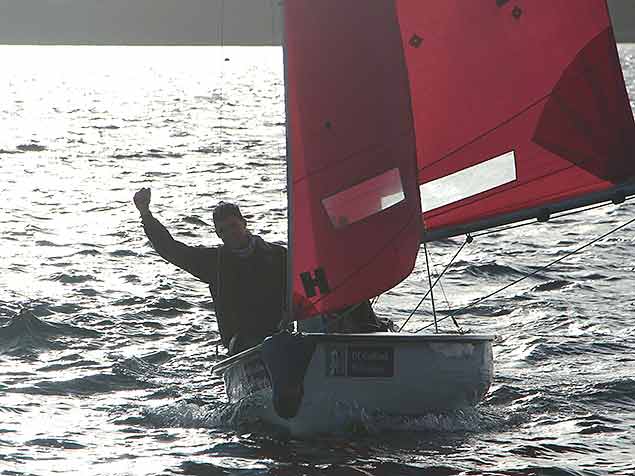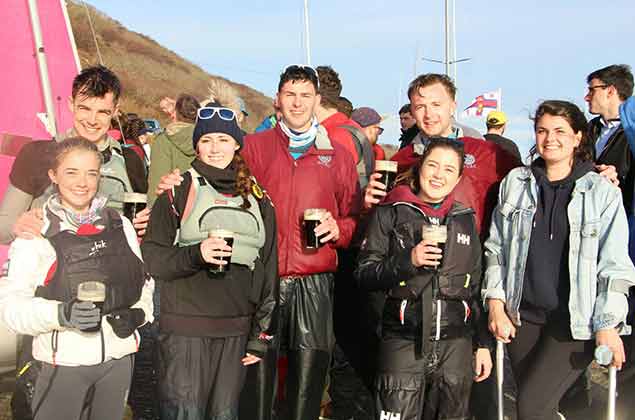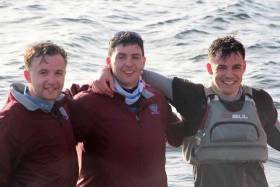Displaying items by tag: University College Dublin
University College Dublin are the First Irish Team to Win British University Opens in 53 Years
It’s beginning to look as though University College Dublin is a sailing university with a work and studies problem. As the pressure builds in all departments ashore and afloat, they’re piling on the pace in the team and match racing areas with the recent overall victory in the British Team Opens – the BUSA Finals – continuing a progression which has included winning the Top Gun at Oxford (first ever for an Irish squad), plus the inaugural Student Match Racing Invitationals at the National Yacht Club.
In fact, the only blips seem to have been the nationals at Carlingford and the Student Keelboat Nationals in the J/80s at Howth, where the title went to Cork. But where a win in this series in times past entitled the winners to represent Ireland in the “Student Yachting Worlds” in France, that’s currently an event which seems to be in abeyance.
But actually winning BUSA is also just about as long ago as anyone can remember. It was 1970, to be precise, when Dublin University Sailing Club, aka Trinity, last did the business - all of 53 years back. That was when Dublin universities used to be a real force in the sailing panorama at home and abroad, as their convenient sailing setup in easily-reached Dun Laoghaire, with each of the three historic colleges - TCD, UCD and the Royal College of Surgeons in Ireland – directly linked to one of the big waterfront clubs, had them starting with a facilities and support advantage which Universities elsewhere could only envy.
 Assessing the heavy air conditions at Grafham. Photo: Georgie Atwell
Assessing the heavy air conditions at Grafham. Photo: Georgie Atwell
Indeed, the natural advantages were even more widespread than was immediately apparent, as owners of cruisers and cruiser-racers were always on the lookout for keen young potential crewmen, and the regular presence of college sailors about the clubs saw many university dinghy sailors add serious offshore experience to their CVs.
RAILROAD CONNECTIVITY
And in an era before really effective road trailers were available, the convenient access to flatbed rail trucks in Dun Laoghaire’s railway station – a much more utilitarian place in those days – meant that the college sailors could get their Fireflies in bulk to any sailing venue near a railhead. Thus for the last Dinghy Week in Baltimore before the West Cork Line closed in 1961, the college Fireflies raced as usual in Dun Laoghaire on Tuesday night, then the boats were towed on their launching trailers the few yards to load up at the railway, and on Friday evening their crews caught up with them ready-delivered to Baltimore’s harbourside station, which subsequently became the first Glenans HQ in Ireland.
 The show is on the road. Kathy Kelly and Jack Fahy looking good for UCD in the finals. Photo: Georgie Atwell
The show is on the road. Kathy Kelly and Jack Fahy looking good for UCD in the finals. Photo: Georgie Atwell
Since then, universities elsewhere have been catching up. But although in recent decades the Irish scene has had an improving pace with truly imaginative locations selected for their Annual Championship, they’ve had to be content with being there or thereabouts in the upper reaches of BUSA, but never quite re-capturing the overall wins of the glory days.
Last year was looking good when they got as far as a tie in one of the semi-finals, but falling the wrong side of the count-back put paid to that. So this year, despite the very favourable omens of early successes at home and abroad, they were playing it as cool as possible when going to the 2023 BUSAs at Grafham Water, hosted by Cambridge.
 Nearly there. Kathy Kelly (sailing with Jack Fahy) at last mark of final. Photo: Georgie Atwell
Nearly there. Kathy Kelly (sailing with Jack Fahy) at last mark of final. Photo: Georgie Atwell
We’ve already carried a brief summary of the successful outcome, but it’s an achievement which deserves much more coverage than that, as everything was challenging. For a start, the weather in the Cambridge area was confused, and couldn’t quite make up its mind whether or not it was on the edge of Storm Noa (or Noah), or indeed whether Noa existed outside France. But either way, the air was extra dense, and recorded wind speeds were imposing much greater pressure than the indicated knots suggested.
ROYAL IRISH YACHT CLUB AND CH MARINE SUPPORT
As to the opposition, 20 top colleges – the elite of British Intervarsity sailing – were lining up a total of 28 teams. Nevertheless the sole Irish squad from UCD arrived at the show on a strong footing, as their home club in Dun Laoghaire these days is the Royal Irish YC, which also wheeled in extra sponsorship, as did CH Marine, in order to boost the support from sports funding at UCD.
 Neat mark trap – Liam Glynn & Triona Hinkson implementing an efficient close-off. Photo: Georgie Atwell
Neat mark trap – Liam Glynn & Triona Hinkson implementing an efficient close-off. Photo: Georgie Atwell
The team were thoroughly representative of UCD’s wide range of courses and are drawn - as you’d expect - from top sailors in several dinghy classes. Yet one fascinating fact is that the majority of them list Royal St George YC as their home club, which says much about the George’s policy of snapping up talent when it appears, in addition to the club’s strong family racing tradition.
CHAMPION TEAM
The new Champion Team are:
- Jack Fahy (capt) RStGYC, reading Commerce, Laser champion
- Kathy Kelly, RStGYC, Architecture, 420 Champion
- Tom Higgins, RStGYC, Business & Law, Laser Champion
- Cian Lynch, Wexford Boat & Tennis Club & RStGYC, Economics & Politics
- Liam Glynn, Ballyholme YC, Physiology, Laser Champion
- Triona Hinkson, RStGYC, Medicine
Our very basic report on Wednesday only gave the outline, and it wasn’t all quite as smooth sailing as that suggested, but this detailed and un-cut report by UCDSC’s Writer-in-Residence Oisin Cullen puts us right in the thick of it:
IN THE MAELSTROM TO VICTORY
UCD has made history by winning the British Intervarsities Team Racing Championship, commonly known as BUSA Finals. This achievement marks the first time since 1970 that an Irish team has won the title. Moreover, the team's triumph at BUSA Finals comes just six weeks after they made another ground-breaking win as the first Irish team to claim victory in the renowned Oxford Top Gun Invitational Regatta.
As is customary, the leading Irish team is invited to compete in the BUSA Finals, and this year the event was hosted by Cambridge University, taking place on Grafham Water from the 12th-14th of April. Having won most of the Irish University events this year along with Top Gun, the UCD team were selected as the Irish team to take on BUSA.
 “Polite and reserved” request for protest in the final by Kathy Kelly and Jack Fahy. Photo: Georgie Atwell
“Polite and reserved” request for protest in the final by Kathy Kelly and Jack Fahy. Photo: Georgie Atwell
The event started with a Swiss league (a rank-adjusted round robin), and saw UCD win 12 from their 14 races, seeing them tied on first going into the knockout stages. This was already a huge improvement on last year's result when UCD narrowly missed out on the quarter finals on countback. The knockout stages on the final day brought conditions of 20+ knots, meaning reefed sails were required.
Sailing was kept close to land where the wind was a shifty 10-25 knots, making for tricky sailing as sailors had to flick from team racing to fleet racing. This didn't stop UCD as they progressed through the quarter finals and semi-finals, beating Bristol and Southampton, respectively.
 Powering through. Tom Higgins and Cian Lynch in total control in the final. Photo: Georgie Atwell
Powering through. Tom Higgins and Cian Lynch in total control in the final. Photo: Georgie Atwell
They now faced Cambridge on home waters in a “first to three wins” final, this match-up being a repeat of the Top Gun final. Race 3 saw Cambridge go 2-1 up in one of the UCD team’s worst ever losses, seeing one boat capsized, the second OCS, and the third two legs behind as a result of several penalties.
CAMARADERIE AND TEAM WORK
The fact that UCD were able to win the next two races back-to-back speaks volumes about the level of camaraderie and team work they have developed as a group. It was done despite the incredibly difficult conditions - both in terms of the weather and mentally overcoming the huge loss they had just been dealt - to become the first Irish team to win BUSA since Trinity in 1970.
 “We’re there!” Triona Hinkson and Liam Glynn approaching the weather mark in the final. Photo: Georgie Atwell
“We’re there!” Triona Hinkson and Liam Glynn approaching the weather mark in the final. Photo: Georgie Atwell
Team member Liam Glynn of Ballyholme on Belfast Lough comments: “All our practice really paid off, knowing precisely our roles despite the best efforts from a brilliant Cambridge team. It is an amazing feeling to come home with this win.”
WILSON TROPHY NEXT ON AGENDA
Whenever a sailing team is on a roll like UCD are this year, it would be an affront to sport not to keep on rolling, whatever the growing academic pressures might be back at College.
Next up on the agenda is the Wilson Trophy close across the Irish Sea at West Kirby on May 12-14th May, the Great Mother of all today’s major team racing championships. It would be a dull study-obsessed dog who would think that UCDSC should not be there in the face of academic demands.
They’ve shown they can work hard, sail hard, and play hard, and Ireland’s sailing community will be with them all the way.
 Winners All Right……UCDSC Team gtting their prizes in St John’s Hall Cambridge are (left to right) Cian Lynch, Kathy Kelly, Tom Higgins, Liam Glynn, Triona Hinkson, Jack Fahy (Capt) and BUSA President Emma Hartley. Photo: Georgie Atwell
Winners All Right……UCDSC Team gtting their prizes in St John’s Hall Cambridge are (left to right) Cian Lynch, Kathy Kelly, Tom Higgins, Liam Glynn, Triona Hinkson, Jack Fahy (Capt) and BUSA President Emma Hartley. Photo: Georgie Atwell
The Irish Universities Sailing Association (IUSA) Intervarsities is a major team racing event attended by over 160 sailors across 26 teams. This year’s, staged at the hospitable Clifden Boat Club in the far west of Connemara and hosted by University College Dublin, enjoyed good if distinctly crisp weather for the weekend of March 10th to 12th. It saw strong representation from all the major universities and colleges in Ireland, Queens from Northern Ireland, and Loughborough from England, together with Edinburgh and a representative team from the Scottish Universities Sailing Association.
 Magic weather at Clifen in Connemara in mid-March, and a magic result for Trinity is celebrated with an air-punch by helmsman Scott Flanigan. Photo: Guy Boggan
Magic weather at Clifen in Connemara in mid-March, and a magic result for Trinity is celebrated with an air-punch by helmsman Scott Flanigan. Photo: Guy Boggan
In competition at this level, merely figuring in the frame at all is quite an achievement. But Dublin University SC – known to all as Trinity – were determined to put an end to an eleven year drought in winning this title. Under the very determined team captaincy of Richard d’Esterre Roberts (who is also a former Captain of the DUSC, and is known to all as Rich Roberts) the Dublin squad got through to the final to find themselves up against University College Cork Team 3.
Roberts being from Cork himself, this added an extra edge, and in a tense final Trinity had worked through to a 2-1 lead when a black flag offence on in the finish line by a Cork boat put Trinity three up. And so Rich Roberts is Sailor of the Month for March, fully supported by his team mates Scott Flanigan, Cara McDowell, Daniel Gill, Kate O’Reilly, and Laragh Lee.
 The Trinity team at Clifden Boat Club celebrate ending their eleven year drought at Clifden Boat Club with their captain Rich Roberts on the left. Photo Guy Boggan
The Trinity team at Clifden Boat Club celebrate ending their eleven year drought at Clifden Boat Club with their captain Rich Roberts on the left. Photo Guy Boggan





























































